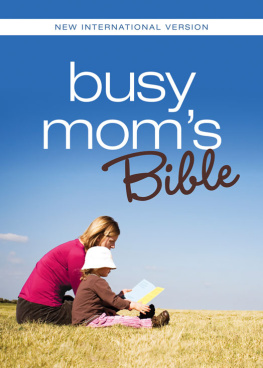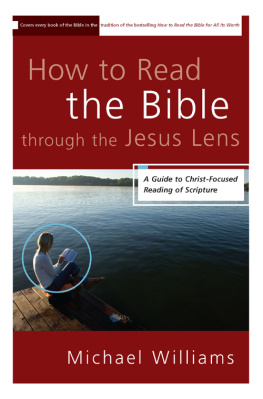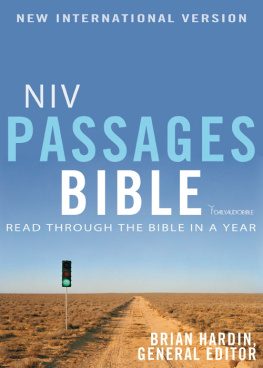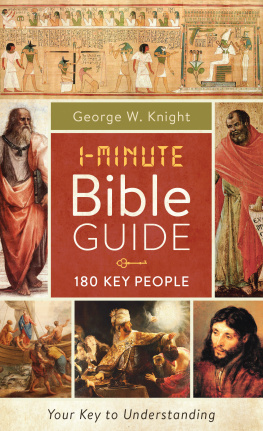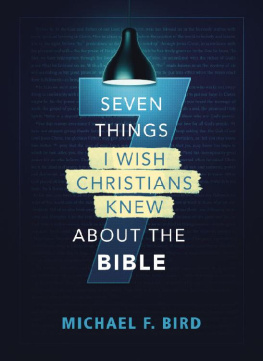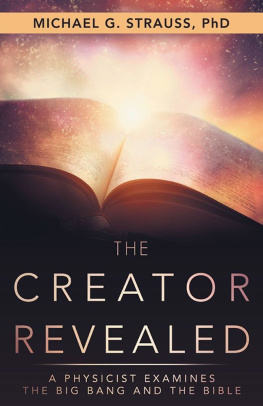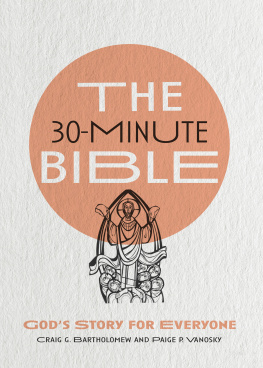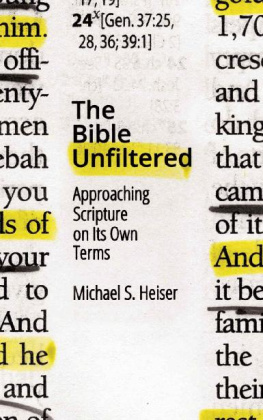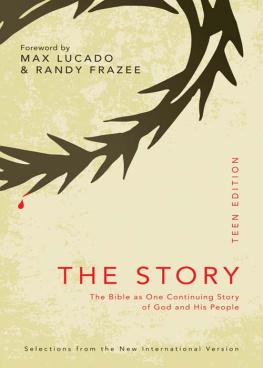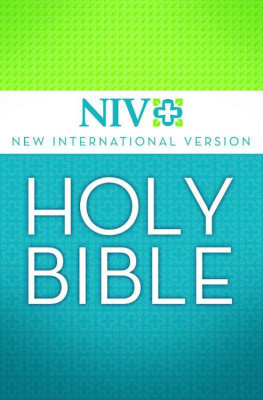So many people talk about the Bible, but so few have actually read it. This new, accessible version bridges that gap. It provides clear insight into the Bibles main themes, figures, and events from Creation to Revelation in under two hours. The 100-Minute Bible is a convenient and enlightening way of experiencing the greatest story ever told.

Michael Hinton was born in Bristol, England. He was a school headmaster before becoming an Anglican minister for a village parish in Kent, and has written several books. He unveiled The 100-Minute Bible at Canterbury Cathedral in 2005.
THE 100-MINUTE BIBLE
This edition published in the United States and Canada in 2007
by Chronicle Books LLC
First published in the United Kingdom in 2005,
by The 100-Minute Press, Canterbury, England
Copyright 2005 by The 100-Minute Press
The use of short portions of this publication, i.e., up to one section, is permitted without reference to the publisher. The publisher requests that the origin of such extracts should be acknowledged as The 100-Minute Bible.
Library of Congress Cataloging-in-Publication
Data is available.
eISBN: 978-0-8118-7163-1
Abridged by Michael Hinton
Map design by Arthur Mount
Chronicle Books LLC
680 Second Street
San Francisco, California 94107
www.chroniclebooks.com
THE 100-MINUTE BIBLE

A bridged by Michael Hinton
TABLE OF CONTENTS
PREFACE
The Bible must be the most popular yet least-read book in the world! It looks so complex, so long, and is in a language from a previous era. And yet its the greatest story ever told, the ultimate love story, the biography of God himself.
It is quite true that the Bible is complex. It was written over sixteen centuries, in sixty-six books, and by scores of different writers, each of whom has their own style. The 100-Minute Bible is designed for people who may not know very much about the Christian faith but want to know why the Bible is so popular with two billion Christians around the world. Its for people who want an easy access into the central Christian story. This little book represents a first-class way of doing just that. Its clear, succinct, an easy readyet is still comprehensive. A word of warning, though! Do not be put off by the bloodthirstiness of the first few sectionsthis is the social context into which God sends his own son to show a new way of living.
The 100-Minute Bible is also for Christians who want to revisit the big picture. Read this and youll see the whole sweep of Gods loving purposes for his world and all its people.
Unlike the traditional Bible, three-quarters of which is devoted to the centuries before Christ, this version centers on Christs life and impact on society. This is simply because the key to unlocking the Bible is Jesus Christ. Its as if he is the great explosion that happened in the center of history and the Bible is a record of its impact.
If were to understand Christianity more fully, ultimately well need to understand something of the context in which it was written, the text itself, and what it meant to those who first read it. But first we need to get hold of the overall story. And this is what The 100-Minute Bible provides so succinctly and elegantly.
Bishop John Pritchard
Oxford, England
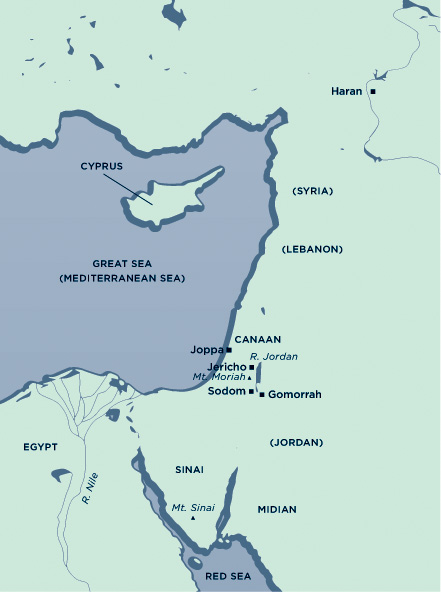
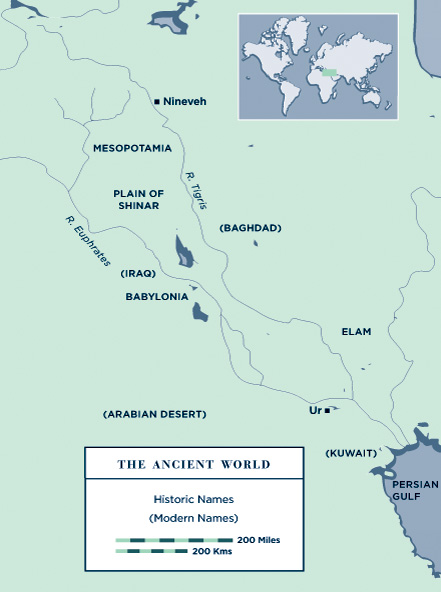
1 IN THE BEGINNING
In the beginning God created heaven and earth over a period of six days. First he created light and darkness; then the vault of the heavens, separating the water above from the water below; then the dry land and all that grows in it. On the fourth day God created the sun, the moon, and the stars; on the fifth the creatures of the sea and sky; and on the sixth those of the land, including humankind. On the seventh day God rested.
God made the first man, Adam, from the dust, and breathed life into him. He placed him in the beautiful and fertile garden of Eden, forbidding him to eat from the tree of the knowledge of good and evil that grew there. Because he thought man should not be alone, he created the first woman from Adams rib; Adam named her Eve. Eve was tempted by the serpent, the most cunning of creatures; she took fruit from the forbidden tree, ate some herself, and gave some to her husband. As a punishment, God expelled them both from the garden; he condemned men to arduous toil, and women to pain in childbearing and to submission to their husbands.
Adam and Eve bore two sons: Cain, who worked the land, and Abel, who cared for sheep. God favored Abels offerings over those of Cain. Cain was angry and murdered Abel; as a punishment God sentenced him to become a wanderer forever. Adam and Eve had further children, and so the human race spread and multiplied.
In subsequent generations humankinds wickedness became more and more apparent, and God decided a fresh start was necessary. He chose Noah, the only blameless man of the time, and told him to build a boat in which he could shelter his family and living creatures of every kind. Then God sent a flood that destroyed every other living thing. When the flood receded, God sent the rainbow as a sign that he would never destroy his creation again.
After the world was repopulated, there was a time when everyone spoke the same language. People migrated to the fertile plain of Shinar between the rivers Tigris and Euphrates; there they decided to build a city named Babel, and a tower that would reach right up to heaven. To thwart them, God confused their language so that they could not understand each other, and scattered them all over the earth.
Genesis 111
2 ABRAHAM
Many generations later a man named Abram lived in Ur of the Chaldees. His family moved to Haran; then, at Gods command, he journeyed south and led a nomadic life until, by agreement with his kinsman Lot, he settled on the west side of the river Jordan. Lot settled in the valley of the Jordan itself, in the city of Sodom. When fire from heaven fell on Sodom and the nearby city of Gomorrah as a punishment for their wickedness, Gods intervention ensured that Lot was spared.
In due course God made a covenant (a binding agreement) with Abram, promising him a son, descendants as many as the stars in the sky in number, and possession of the whole land of Canaan. As a sign of the covenant, God renamed Abram Abraham (which means father of a multitude), and he and all the males of his family were circumcised. By now he was a man of great wealth in cattle, silver, and gold, but he and his wife were childless.
In their extreme old age, and by a special providence from God, Abraham and his wife Sarah bore a son, Isaac. While Isaac was still a boy, God put Abrahams faith and obedience to a supreme test. He told him to take his son and to sacrifice him at a shrine on the mount of Moriah. Abraham had reached the point of binding Isaac, laying him upon the altar, and taking a knife to slay him, when God called to him from heaven and told him to substitute a ram for his son. Abraham joyfully did so, and called the place The Lord will provide.
After this Abraham sent one of his servants back to Haran to find a wife for Isaac from his wider family. At a wellside in Haran the servant met Rebecca, daughter of a nephew of Abraham. He was struck by her grace and beauty and by the hospitality her family offered him, and asked if she might be given to Isaac in marriage. She and her male relations consented, and after her journey south the marriage took place. Rebecca was childless at first, but after Abrahams death she bore twin boys, Esau first, then Jacob.
Next page


